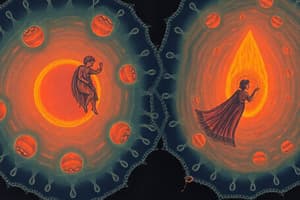Podcast
Questions and Answers
What is the fundamental unit of life responsible for sustaining, propagating, and evolving all living organisms?
What is the fundamental unit of life responsible for sustaining, propagating, and evolving all living organisms?
Which molecule serves as the genetic blueprint in the form of DNA within a cell?
Which molecule serves as the genetic blueprint in the form of DNA within a cell?
Which part of the cell houses various organelles that assist in specific cellular processes?
Which part of the cell houses various organelles that assist in specific cellular processes?
What is the process by which one cell splits into two identical daughter cells, each containing the same number of chromosomes?
What is the process by which one cell splits into two identical daughter cells, each containing the same number of chromosomes?
Signup and view all the answers
What is the main purpose of meiosis?
What is the main purpose of meiosis?
Signup and view all the answers
According to the cell theory, what is the basic unit of life?
According to the cell theory, what is the basic unit of life?
Signup and view all the answers
Which organelle is responsible for converting nutrients into energy in the form of ATP?
Which organelle is responsible for converting nutrients into energy in the form of ATP?
Signup and view all the answers
What is the function of ribosomes in a cell?
What is the function of ribosomes in a cell?
Signup and view all the answers
What does the innermost membrane of the chloroplast, the protonoplast, house?
What does the innermost membrane of the chloroplast, the protonoplast, house?
Signup and view all the answers
What is the outcome of cell division according to the cell theory?
What is the outcome of cell division according to the cell theory?
Signup and view all the answers
Study Notes
Unraveling the Fundamental Unit of Life: A Comprehensive Look at Cells, Their Functions, Division, Theory, and Structure
Life on Earth is intricately woven together by the smallest, yet most crucial building blocks–cells. These microscopic marvels serve as the fundamental unit of life, responsible for sustaining, propagating, and evolving all living organisms. In this article, we will delve into the fascinating world of cells, exploring their function, division, the cell theory, and structure.
Cell Function
Cells are the smallest and most basic functional units within living organisms. They are specialized to carry out specific tasks, ensuring the optimal functioning of the organism. Some cells are responsible for gathering energy (e.g., plant cells via photosynthesis), while others are tasked with muscle movement or waste removal.
Each cell contains a genetic blueprint in the form of DNA (deoxyribonucleic acid) and is enveloped by a protective membrane. The cell's interior, known as the cytoplasm, houses various organelles that assist in specific cellular processes.
Cell Division
Cells divide and reproduce through a process called cell division, which is essential for growth, development, and repair. There are two main types of cell division: mitosis and meiosis.
- Mitosis is the process by which one cell splits into two identical daughter cells, each containing the same number of chromosomes (DNA). This ensures that genetic information is accurately passed down from one generation to the next.
- Meiosis is a specialized form of cell division that occurs during the production of gametes (sperm and egg cells). Meiosis results in daughter cells with half the number of chromosomes, which allows for the combination of genetic material when two gametes fuse during fertilization.
Cell Theory
The cell theory, proposed in the 19th century, states that all living organisms are composed of one or more cells. Moreover, the cell is the basic unit of life, capable of growth, reproduction, and maintenance of the organism's identity.
The cell theory comprises two key principles:
- The Cell Principle – All living organisms are composed of one or more cells.
- The Cell Theory of Growth and Reproduction – Cells grow, divide, and produce new cells through cell division.
Cell Structure
Cells exhibit a diverse range of structures and shapes to accommodate their specific functions. Some common cellular structures and organelles include:
- Protonoplast – The innermost membrane of the chloroplast, which houses the electron transport chain and is responsible for photosynthesis.
- Ribosomes – Tiny organelles responsible for protein synthesis, essential for cellular growth and maintenance.
- Endoplasmic Reticulum – A network of membrane-enclosed sacs involved in the synthesis, folding, and transport of proteins.
- Lysosomes – Membrane-bound organelles containing enzymes that break down waste materials.
- Mitochondria – The "powerhouse" of the cell, responsible for converting nutrients into energy in the form of ATP (adenosine triphosphate).
In conclusion, cells serve as the fundamental unit of life, responsible for sustaining, propagating, and evolving all living organisms. They come in a variety of shapes and sizes, working in harmony to ensure the optimal functioning of the organism. Cell division, the cell theory, and cell structure are integral aspects of our understanding of cells and their functions. As we continue to unravel the complexities of cellular life, we gain a deeper understanding of the world we live in and the incredible biological systems that support us.
Studying That Suits You
Use AI to generate personalized quizzes and flashcards to suit your learning preferences.
Description
Explore the intricate world of cells, from their essential functions to the process of cell division, the foundational cell theory, and the diverse structures and organelles within a cell. Gain a comprehensive understanding of the fundamental unit of life.




